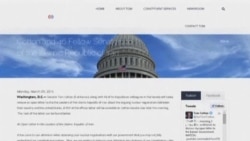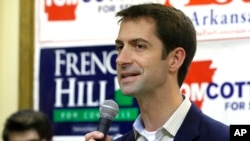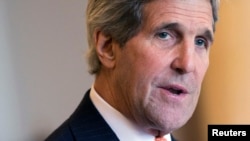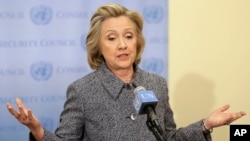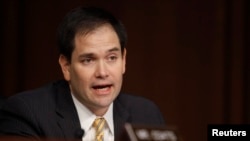No matter what happens with the negotiations over curbing Iran’s nuclear program, count on the issue being front and center during next year’s U.S. presidential election campaign.
The recent letter sent to Iran’s leaders by 47 Senate Republicans highlights the sharp divide between the Obama administration’s approach to the Iran talks and the skeptical view from conservative critics. The letter, authored by freshman Senator Tom Cotton of Arkansas, set off a political firestorm in Washington.
But for the most part the Republicans who signed the letter are standing by it and a defiant Cotton issued a defense on CBS’s Face the Nation.
“Well it is a simple fact of our Constitution that if Congress does not approve the deal then it may not last. And the deal that is on the table right now is a very bad deal.” Cotton later told Bloomberg: “The president views Congress as an afterthought. Iran’s leaders clearly have the message now and I think it was important they got the message.”
Many Democrats were appalled by what they saw as a breach of precedent by members of Congress communicating directly with a foreign power and leading U.S. adversary.
Secretary of State John Kerry responded to Cotton on the CBS’ show Face the Nation.
“What I do know is that this letter is absolutely calculated directly to interfere with these negotiations,” he said.
Likely Democratic contender Hillary Clinton defended the Obama administration’s negotiating approach and went after the Republicans who signed the letter.
“Either these senators were trying to be helpful to the Iranians or harmful to the commander in chief in the midst of high-stakes international diplomacy. Either answer does discredit to the letter’s signatories.” Clinton added, “No one considering running for commander in chief should be signing on.”
It’s likely much more about this will come out in the presidential primary debates that begin later this year.
“The letter signed by 47 Republican senators is just truly unprecedented,” said Ken Sofer, a national security expert with the Center for American Progress, a liberal think tank in Washington, who says the issue will resonate into 2016. “To undermine a president’s private negotiations with another world leader is just something we have never seen before.”
Iran on campaign trail
The political flap over the letter is just the beginning.
Supporters of the Obama administration’s efforts to negotiate a nuclear deal with Iran took heart from a recent CNN-ORC poll that found 68 percent of those surveyed supported the diplomatic negotiations with Iran while 29 percent were opposed.
Support seemed to cross party lines with 77 percent of Democrats, 65 percent of Republicans and 64 percent of independents favoring the talks. Americans were more divided on whether the Republican letter to Iran was a good idea.
Forty-nine percent said the letter went too far while 39 percent said it was appropriate, another sign that policy toward Iran will remain a divisive political issue for the foreseeable future.
The widely divergent attitudes of the Obama White House and conservatives in Congress has already emerged as a major point focus in the very early stage of the U.S. presidential campaign with likely Republican presidential contenders trying to outdo one another in sounding tough on Iran.
An early indication of the focus on Iran came during the recent Conservative Political Action Conference near Washington where numerous Republican White House hopefuls auditioned in front of a boisterous conservative crowd.
Former Texas Governor and likely presidential contender Rick Perry set the tone early on when he listed his foreign policy priorities.
“Number one is Iran should not be allowed to develop nuclear weapons—period,” he said.
Several other likely contenders followed Perry to the stage including former Florida Governor Jeb Bush, Wisconsin Governor Scott Walker, Texas Senator Ted Cruz and Florida Senator Marco Rubio.
Rubio has staked out a conservative approach on foreign policy. Rubio told the Associated Press this week that as president he would be willing to defy European allies and pull the U.S. out of any nuclear deal agreed to under the Obama administration.
Rubio, Cruz, and Kentucky Senator Rand Paul signed the Republican letter to Iran and other likely Republican White House contenders have also expressed support.
Jeb Bush brought up the issue during a recent visit to the early presidential primary state of New Hampshire.
“I’m considering the possibility of running for president and I would, as president, not negotiate a treaty with Iran that would legitimize the Ayatollah and the brutality of that regime,” he said.
Wisconsin Governor Scott Walker also weighed in during an interview with WMUR TV in Manchester, New Hampshire.
“If you are making a major decision with a foreign country, in this case like Iran, I think the Constitution clearly requires the advice and consent of the United States Congress,” he said.
The firestorm over the letter also shows that polarized domestic politics is having a negative impact on foreign policy, said George Washington University political analyst Matt Dallek.
“There is a ton of animosity and I think after Obama signed the executive order on immigration reform the Republican’s attitude in Congress was ‘we are going to do everything we can to kind of get back at him, to poke him, to undermine him even in areas where traditionally it is not Congress’ role,”’ he said.




